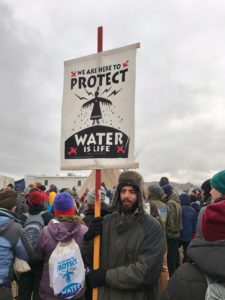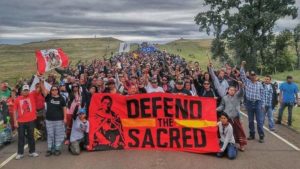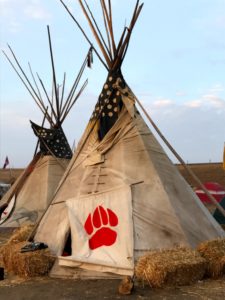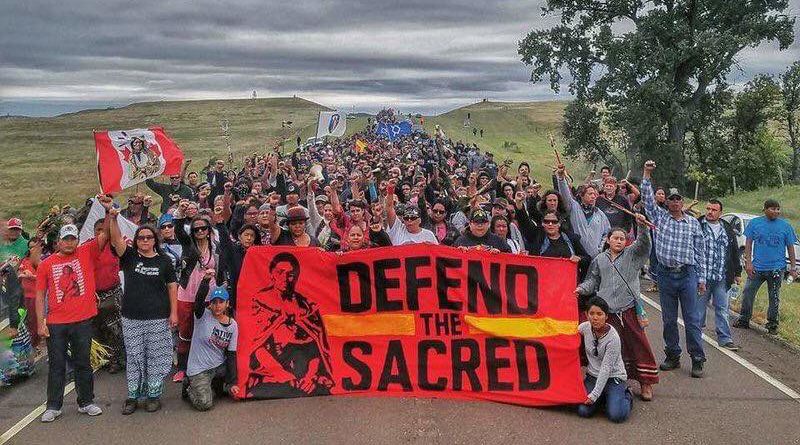“Water is Life”: Nonviolence and Standing Rock by Aric Clark
 Climate change is going to be a series of painful reality checks. By this I mean, we are going to have to confront the way some of our systems of metaphor and meaning have betrayed us into forgetting our position in the universe, our carnal reality.
Climate change is going to be a series of painful reality checks. By this I mean, we are going to have to confront the way some of our systems of metaphor and meaning have betrayed us into forgetting our position in the universe, our carnal reality.
I’m so used to my religious and political rhetoric being steeped in metaphor that I almost didn’t recognize a literal truth when I saw it. When I went to Standing Rock as part of a delegation organized by the Presbyterian Peace Fellowship last November I had already begun reflecting on all of the layers of symbolism and meaning behind the phrase “Mni Wiconi (Water is Life)”. But while I was staying in Camp Oceti Sakowin I was brought up short by the literal import of the words. You can’t drink oil. Water IS life. It isn’t symbolic of life. You are water. You’re basically a cucumber with feelings.
Who can endure dwelling on the existential absurdity of life for too long, though? So we distract ourselves with layers of identity and metaphor. We don’t think of ourselves as flesh and blood composed of the repurposed molecules of other things made of flesh and blood. We think of ourselves as individuals, citizens, and consumers. We conduct our relationships and frame our behaviors through layers of abstraction which obscure our fundamental connection to the earth. We draw borders and forge nationalities designed to make it easier to uproot people who authentically belong to a place, and to turn earth, and water, and air into things which other people can claim to own.
When we talk about “making a living” in our culture we’re talking about money, which is so ironic it would send Jesus into one of those laugh-so-you-don’t-cry fits that ends in tears anyway. Money isn’t life, it’s death. You can’t eat money. Money doesn’t grow. Trust me, it doesn’t. Interest isn’t money growing. Interest is reaping where you didn’t sow.
There’s a parable about this, often called the parable of the talents. A master gives three slaves some money and goes away on business. Two of the slaves use that money to give loans and apply leverage to other people and end up being able to give the master even more money when he returns. One of the slaves buries the money in the ground. When the master returns the third slave throws the money back in the master’s face, confronting him about his habit of oppressing his neighbors. Burying the money is meant to reveal the absurdity of the metaphor of money “growing”. The metal buried in the soil doesn’t send up shoots. It bears no fruit. It’s a dead seed.



It’s precisely in such dead seeds that our society has placed its trust, knowing in the back of our minds that we are reaping what we did not sow. In the case of fossil fuel, we literally did not (and cannot) sow the seed, and harvesting the crop has at every step of the process been a game of ensuring the costs of our greed fall on someone else. We call environmental destruction an externality, we say conflicts over exploitative extraction are legal disputes, and we label the devastation of storms like Harvey and Irma “acts of God”.
The thing about literal truths is they’re true, whether we acknowledge them or not. If we go on acting like oil is more precious than water we will die of thirst. If we go on acting like money is more valuable than food we will die of hunger. If we go on acting like what we put into the air doesn’t affect us the skies and the seas will rise up and show us how wrong we are.
In a way, climate change will resolve itself. It doesn’t care about us, and ultimately no one can escape it. But long before that happens, the most vulnerable people, the ones who have not reaped where they didn’t sow, will have paid the highest cost. As long as a portion of powerful and privileged folks can privatize the profits while socializing the damages, they will continue to do so, and thus the roots of violence and conflict in our world will continue to be embedded in the soil of wealth extraction.
This means the work of peacemaking must be more literal, more embodied, than ever. When our enemies hide behind disembodied corporations and abstract legal entities, we must be physically present in the streets and in the pathway of the pipelines. When our enemies point to the value of a barrel of oil or the strength of the markets, we must point to the worth of rich topsoil and the treasure of potable water. When our enemies take refuge in globalization, we must be planted in our neighborhoods and our watersheds.
The elders at Standing Rock spoke a lot about remembering. They kept telling those of us of European descent who were guests in their camp that we were once connected to the land too, but we exchanged the nourishing wisdom of that experience for the dead seeds of conquest and domination. So let’s re-member. Let’s put arms and legs, flesh and bones, to the knowledge that water is life.
Aric Clark is a writer, a speaker, and Presbyterian minister who lives in Portland, Oregon with his wife and two gremlins pretending to be his sons. He is the co-author of Never Pray Again: Lift Your Head, Unfold Your Hands, and Get To Work, a book which challenges readers to embrace a concrete other-centered spirituality. He is also the creator of LectionARIC a youtube channel for hermeneutical vlogs. When he is not writing, preaching, or parenting, Aric can be found engaging his tabletop gaming hobby, or cooking for a crowd of random strangers he invited home without his wife’s permission. He is a pacifist and he still can’t grow a beard.

